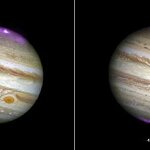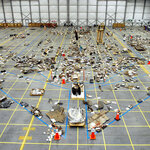This is a DRAFT for a new blog post for my Science20 blog http://science20.com/robertinventor - sharing it here as this blog has few views, to work on it and discuss it with friends etc.
This is one of the questions I get asked most often since I started to cover the topic of asteroid impacts. Will humans will become extinct within a decade, or within a century? And can this happen through natural disasters?
Some people get very worried about this, and they are most worried, usually, about asteroid impacts. I blame the movies there. But what's the real situation? I'll focus on things that…
Space

This is a DRAFT for a new blog post for my Science20 blog http://science20.com/robertinventor - sharing it here as this blog has few views, to work on it and discuss it with friends etc.
The news stories are so full of plans to send humans to Mars at the moment, hoping to colonize the planet, that other long term ideas for humans in space tend to get forgotten. Elon Musk even has plans to send a hundred people at a time in his proposed "Mars Colonial Transporter" and found a city of 80,000, and eventually a million. He is due to reveal these plans at the IAC conference this September. And…
In case you haven't heard of it, Nibiru is a totally nuts idea. Yet it gets many people very scared. I started to get messages about it as a result of writing articles about asteroid impacts, and how we can detect and deflect asteroids. It is possible to have beliefs that don't make any sense if you look at them closely. For instance, if you believe that you can have a square with every point on its edges equally distant from its center in ordinary geometry - that's impossible. That's a square circle. Nibiru is a belief of this sort.
There's yet another Nibiru scare underway. Every few months…

Solar storms trigger Jupiter's intense 'Northern Lights' by generating a new X-ray aurora that is eight times brighter than normal and hundreds of times more energetic than Earth's aurora borealis, new research finds.
It is the first time that Jupiter's X-ray aurora has been studied when a giant storm from the sun has arrived at the planet.
The dramatic findings complement NASA's Juno mission this summer, which aims to understand the relationship between the two biggest structures in the solar system - the region of space controlled by Jupiter's magnetic field (its magnetosphere) and…

I wrote this soon after ExoMars's successful launch to Mars, 2015. Hurray! In the program about the mission, before and during the launch, the presenters talked about the care they take to sterilize the lander of microbes to protect Mars. And indeed, kudos to all the space faring countries, and the planetary protection officers, for doing this. But in the same program they talked about ideas to send humans to Mars, talking about all its benefits. For some reason it never seems to occur to anyone to ask if humans can be sterilized in the same way as robots. There is nothing unusual about this…
Elon Musk hopes to land a hundred colonist hopefuls at a time as soon as the early 2030s. NASA also proposes its "Road Map to Mars" which could see human "boots on Mars" in the near future. It is hard enough to sterilize robots sufficiently to search for life on Mars. We can't sterilize human missions to the same standards.
If we go ahead with these plans, we will have to relax planetary protection measures. But is it the right time to do this?
If we "win the exobiology lottery" here, it would revolutionize biology for sure. Also, look at the wood, plastics and other products of…
I can foresee a possible clash between those that want to send humans to Mars, and those who want to protect the planet from Earth life. Humans may go there in the near future, as soon as fifteen years into the future if Elon Musk is right, and in the fairly new future also if NASA'S "Road Map to Mars" goes through. Experts are exploring ways to permit humans on the surface with somewhat relaxed planetary protection measures. But is this a sensible way to proceed. Can we have a "compromise solution" here.
It is hard enough to sterilize robots sufficiently to search for life on Mars. We can't…

It is hard enough to sterilize the robots we send to Mars to search for life. How can we expect to do the same for humans? It's at least a major challenge. I've argued that to start with we should send humans to Mars orbit only. They would explore the surface by telerobotics. That way you use the best talents of both humans and robots in collaboration. It's surely the best way to protect the planet from Earth life.
The best possible outcome here could be the most significant revolution in biology, perhaps since the first discovery of microbes and living cells. A "super positive outcome".
We…

NASA hopes to go full speed ahead with its "Road to Mars" to land humans on the planet, and Elon Musk wants to build a city of a million on Mars by 2100, but it is rare for anyone in the debates to mention planetary protection. I think many assume it has already been dismissed by simple arguments like this one of Zubrin's - but far from it. As some of the listeners said to me when I was guest on the Space Show last Monday, the disconnect is enormous.
This is an argument Robert Zubrin often uses in his talks to say why he thinks it doesn't matter if we introduce Earth life to Mars, mixing…
This is another in my now rather frequent articles to reassure people who are panicking because of news stories, saying that there is a chance we will all die in a big future cataclysm. No, this is all total bullshit! (I can use the word bullshit because here in the UK it is a very mild word, not even a swear word quite, e.g. often used on prime time TV, though I understand it is a strong word in some parts of the States).
It's all over now, but perhaps this story will be educational for those of you who panic about such things. It all blew up from a story that we would get an…